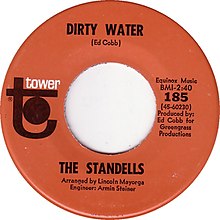
The Standells are an American garage rock band from Los Angeles, California, formed in the 1960s, who have been referred to as a "punk band of the 1960s", and said to have inspired such groups as the Sex Pistols and Ramones. They recorded the 1966 hit "Dirty Water", written by their producer, Ed Cobb. "Dirty Water" is the anthem of several Boston sports teams and is played following every Boston Red Sox and Boston Bruins home win.

The Beau Brummels were an American rock band. Formed in San Francisco in 1964, the band's original lineup included Sal Valentino, Ron Elliott, Ron Meagher, Declan Mulligan, and John Petersen (drums). They were discovered by local disc jockeys who were looking to sign acts to their new label, Autumn Records, where Sylvester Stewart—later known as Sly Stone—produced the group's early recording sessions. Initially, the band's musical style blended beat music and folk music and typically drew comparisons to the Beatles, while their later work incorporated other music genres such as psychedelic rock and country rock.

The Chocolate Watchband is an American garage rock band that formed in 1965 in Los Altos, California. The band went through several lineup changes during its existence. Combining psychedelic and garage rock components, their sound was marked by David Aguilar's lead vocals, songwriting, as well as proto-punk musical arrangements. The band's rebellious musical posture made them one of the harder-edged groups of the period with many critics labeling them as America's answer to the Rolling Stones.
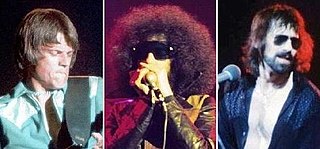
The J. Geils Band was an American rock band formed in 1967, in Worcester, Massachusetts, under the leadership of guitarist John "J." Geils. The original band members included vocalist Peter Wolf, harmonica and saxophone player Richard "Magic Dick" Salwitz, drummer Stephen Bladd, vocalist/keyboardist Seth Justman, and bassist Danny Klein. Wolf and Justman served as principal songwriters. The band played R&B-influenced blues rock during the 1970s and soon achieved commercial success before moving toward a more mainstream radio-friendly sound in the early 1980s, which brought the band to its commercial peak. They performed a mix of cover songs of classic blues and R&B songs, along with original compositions written primarily by Wolf and Justman, as well as some group compositions written under the pseudonymous name Juke Joint Jimmy, representing compositions credited to the entire band as a whole. After Wolf left the band in 1983 to pursue a solo career, the band released one more album in 1984 with Justman on lead vocals, before breaking up in 1985. Beginning in 1999, the band had several reunions prior to the death of its namesake, J. Geils, on April 11, 2017.

"Tessie" is both the longtime anthem of Major League Baseball (MLB)'s Boston Red Sox and a 2004 song by the punk rock group Dropkick Murphys. The original "Tessie" was from the 1902 Broadway musical The Silver Slipper. The newer song, written in 2004, recounts how the singing of the original "Tessie" by the Royal Rooters fan club helped the Boston Americans win the first World Series in 1903. The name Tessie itself is a diminutive form used with several names, including Esther, Tess, and Theresa/Teresa.

The Four Preps are an American popular music male quartet. In the 1950s, 1960s, and 1970s, the group amassed eight gold singles and three gold albums. Their million-selling signature tunes included "26 Miles ", "Big Man", "Lazy Summer Night", and "Down by the Station".

"Hey Joe" is an American song from the 1960s that has become a rock standard and has been performed in many musical styles by hundreds of different artists. The lyrics tell of a man who is on the run and planning to head to Mexico after shooting his unfaithful wife. In 1962, Billy Roberts registered "Hey Joe" for copyright in the United States.

"I Put a Spell on You" is a 1956 song written and recorded by "Screamin' Jay" Hawkins. The selection became a classic cult song, covered by a variety of artists. It was Hawkins' greatest commercial success, reportedly surpassing a million copies in sales, even though it failed to make the Billboard pop or R&B charts.
Edward C. "Ed" Cobb was an American musician, songwriter, and record producer, most notably during the 1950s and 1960s. He is best known for writing the song "Tainted Love" for Gloria Jones, which later became a hit worldwide when it was covered by Soft Cell.
The Routers were an American instrumental group in the early 1960s.
"It's All Over Now" is a song written by Bobby Womack and his sister-in-law Shirley Womack. It was first released by The Valentinos, featuring Bobby Womack, in 1964. The Rolling Stones heard it on its release and quickly recorded a cover version, which became their first number-one hit in the United Kingdom, in July 1964.

"Who Do You Love?" is a song written by American rock and roll pioneer Bo Diddley. Recorded in 1956, it is one of his most popular and enduring works. The song represents one of Bo Diddley's strongest lyrical efforts and uses a combination of hoodoo-type imagery and boasting. It is an upbeat rocker, but the original did not use the signature Bo Diddley beat rhythm.
"Bony Moronie" was the third single by Larry Williams, released in 1957.
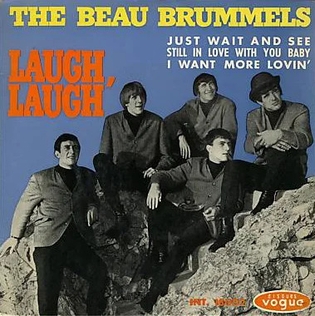
"Laugh, Laugh" is a song by American rock group the Beau Brummels, written by guitarist Ron Elliott and produced by Sylvester Stewart, later known as Sly Stone. Released in December 1964 as the band's debut single, the song reached number 15 on the U.S. Billboard Hot 100 chart the following February. "Laugh, Laugh" was the first hit single to come out of the emerging San Francisco music scene in response to the British Invasion. The song was later included on the band's first full-length album, Introducing the Beau Brummels, released in April 1965.

Triangle is the fourth studio album by American rock band the Beau Brummels. Produced by Lenny Waronker and released in July 1967, it was the band's first album to include songs that vocalist Sal Valentino and guitarist Ron Elliott composed together. The band incorporated fantasy elements and surreal characters into the album's song titles and lyrics, and worked with a variety of session musicians to create Triangle's psychedelic musical style. The Beau Brummels were reduced to a trio—Valentino, Elliott, and Ron Meagher—at the time Triangle was recorded, as former group members Don Irving (guitars) and John Petersen (drums) left the band following the release of the group's previous album, Beau Brummels '66.
Lincoln Mayorga was an American pianist, arranger, conductor and composer who worked in rock and roll, pop, jazz and classical music.
Let's Go (Pony) is a 1962 song by The Routers. Its infectious “[clap clap clap-clap-clap clap-clap-clap-clap] Let's Go!" chant became a favorite of cheerleaders and football fans worldwide. The musicians were key members of the famous session musicians known as the Wrecking Crew: Earl Palmer (drums), Plas Johnson (saxophone), Tommy Tedesco (guitar), Bill Pitman (guitar), and Jimmy Bond (bass).

Dirty Water is the first studio album by the American rock band the Standells, released in May 1966.
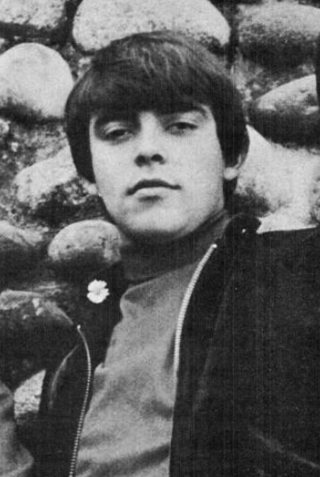
Joseph Richard Dodd Jr. was an American actor and musician who was a cast member of The Mickey Mouse Club starting in its first season, and later a member of several musical groups including The Standells. He was the lead singer on that band's 1966 Billboard hit, "Dirty Water", which includes the refrain "...Boston, you're my home".
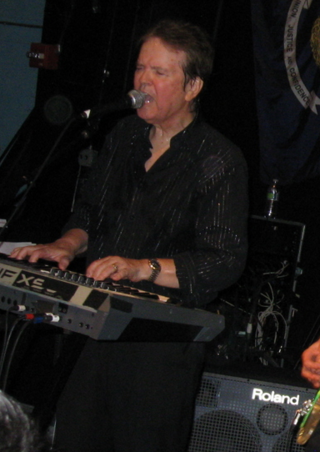
Larry Tamblyn is an American musician and a The Standells member since the 1960s.
